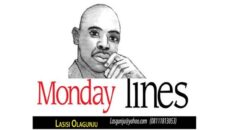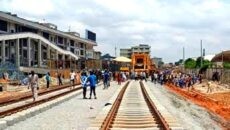President Muhammadu Buhari expresses confidence in the future of Nigeria at 2019 Democracy Day and promises to build on the gains of his first term.
President Muhammadu Buhari began the era of June 12 as Democracy Day in Nigeria on an optimistic spirit at the Eagle Square Abuja. Having been sworn in on May 29, the celebration was deferred to June 12, which the National Assembly has enacted as the new Democracy Day in honour of the late Moshood Abiola, winner of the June 12, 1993, presidential election. Abiola died in 1998 while in detention after drinking tea during a meeting in the pursuit of his mandate. Democracy returned to Nigeria on May 1999 due to the stringent struggle of pro-democracy activists against military rule. Buhari is a direct beneficiary of that struggle and he showed his gratitude by sending a bill to the National Assembly to make June 12 Nigeria’s new Democracy Day. In his speech, which was deferred to June 12 after his swearing-in on May 29, Buhari enthused that change, which was his party’s slogan in 2015, has come to Nigeria and that the next level is to consolidate on the gains of the last four years.
“The principal thrust of this new administration is to consolidate on the achievements of the last four years, correct the lapses inevitable in all human endeavors and tackle the new challenges the country is faced with and chart a bold plan for transforming Nigeria.”A grateful Buhari acknowledged his education in public schools and his public service through states of the Federation and Abuja. Humbled by the experience, he promised to “dedicate the rest of my life to work for the unity of Nigeria and upliftment of Nigerians.”He observed that Nigerians want to live together despite the roiling conflict across the country: “Most of the instances of inter-communal and inter-religious strife and violence were and are still as a result of sponsorship or incitements by ethnic, political or religious leaders hoping to benefit by exploiting our divisions and fault lines, thereby weakening our country.”
He noted that Nigeria has potentials and would be a great country if those resources could be harnessed. “We have water, arable land, forests, oil and gas and vast quantities of solid minerals. We are blessed with an equable climate. However, the bulk of our real wealth lies in agriculture, livestock, forestry, and mining. We possess all the ingredients of a major economic power on the world stage.”The way out, he affirmed, “is the will to get our acts together. And our strength is in our people – our youth, our culture, our resilience, our ability to succeed despite the odds.”
He said he anchored his government on three pillars: security, economy and fighting corruption. Four years after he said he has made progress on all. “Admittedly, some of the challenges still remain in kidnappings and banditry in some rural areas. The great difference between 2015 and today is that we are meeting these challenges with much greater support to the security forces in terms of money, equipment, and improved local intelligence. We are meeting these challenges with superior strategy, firepower and resolve.”
According to him, “with leadership and a sense of purpose, we can lift 100 million Nigerians out of poverty in 10 years.”On the economy, Buhari reported eight quarters of positive growth and an expected GDP growth of 2.7 percent this year. According to the National Bureau of Statistics, GDP grew by 3.96 percent at the time Buhari assumed office in 2015. Absence of an economic team and lack of a robust fiscal policy to support the monetary policy plunged the economy into painful recession, which saw naira slide as low as N506 to a U.S dollar.
The International Monetary Fund, IMF, in its World Economic Outlook Update released in January, revised down Nigeria’s GDP projection for 2019 to two percent, down from the 2.3 percent projected in October 2018. The NBS reported the first quarter GDP of 2019, at 2.01 percent down from 2.38 percent in the fourth quarter of 2018.
He reported the external reserve at $45 billion, just “enough to finance over 9 months of current import commitments.” The external reserve was $28.6 billion by May 2015, which means that the Buhari government has grown the reserve by$16.4 billion in four years.
In the next level, he said the government would “extend access to small-scale credits and inputs to rural farmers, credit to rural micro-businesses and opening up many critical feeder roads…support domestic production of basic goods and reduce our reliance of imported goods” in a yet to be defined policy.
“For the next four years, we will remain committed to improving the lives of people by consolidating efforts to address these key issues as well as emerging challenges of climate change, resettling displaced communities and dealing decisively with the new flashes of insecurity across the country, and the impacts on food scarcity and regional stability.”
Former Nigerian presidents – Yakubu Gowon, Olusegun Obasanjo, Ibrahim Babangida, Abdulsalam Abubakar, and Goodluck Jonathan – stayed away from the ceremony. Among them, Gowon was the only one that attended Buhari’s swearing-in for second term on May 29.
A few African presidents attended the event: Paul Kagame, president of Rwanda; George Weah of Liberia; Mohamed Ould Abdel Aziz of Mauritania; Denis Sassou Nguesso of Congo; Macky Sall of Senegal; Nana Akufo-Addo of Ghana; and Adama Barrow of Gambia.
The absence of world leaders at the occasion underlined Nigeria’s paperweight at the global stage.
The highlight of the occasion was the naming of the Abuja national stadium after M.K.O Abiola.
Atiku Abubakar, former vice president and PDP presidential candidate in the 2019 election, said that it takes more than declaration of June 12 democracy Day to be a democrat.
“It is not enough to declare June 12 a Democracy Day when the government of the day is disrespectful of the rule of law and wantonly disregards court orders on issues that border on fundamental human rights. It is not enough to declare June 12 a work-free day when the ordinary people of Nigeria still don’t have the freedom to find a better life from the suffocating grip of poverty, when Nigeria is now the global headquarters of extreme poverty.
“It is not enough to declare June 12 a work-free day when a disproportionate number of citizens are not sure of where their next meal will come from and when the sanctity of their lives is not guaranteed.
“It is not enough to declare June 12 a work-free day when freedom of the press, and of speech, fundamentals of democracy is being assailed.
“Suffice it to state that the idea of June 12 is not merely to declare it as a Democracy Day much as celebratory and commendable it might seem. The idea behind the event of June 12, 1993, embodies something much bigger than that. It was a threshold moment in our national life that demands of us as democrats to do a soul searching and ask the salient question of all time: how better off are Nigerians?”



 WhatsApp us
WhatsApp us